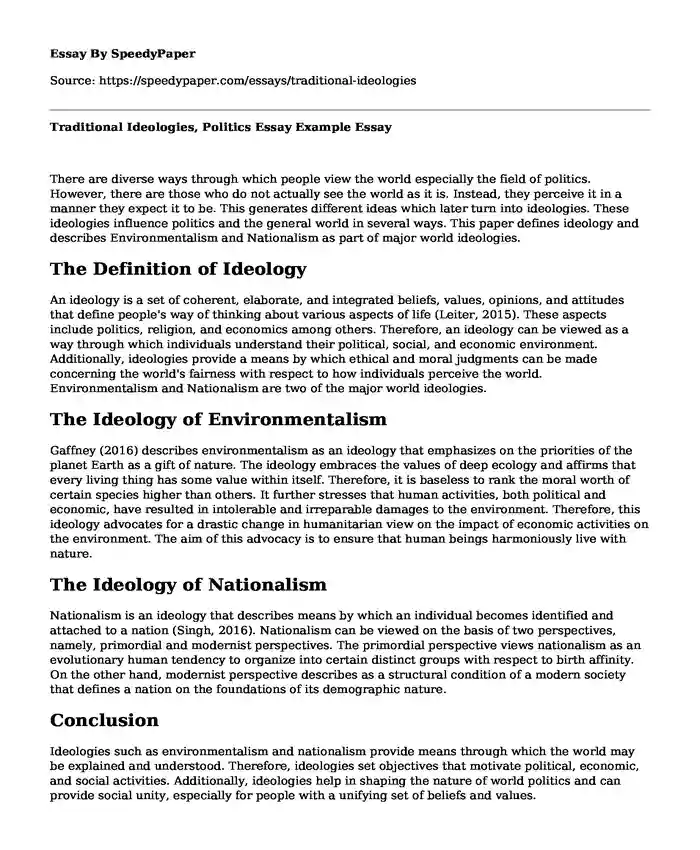There are diverse ways through which people view the world especially the field of politics. However, there are those who do not actually see the world as it is. Instead, they perceive it in a manner they expect it to be. This generates different ideas which later turn into ideologies. These ideologies influence politics and the general world in several ways. This paper defines ideology and describes Environmentalism and Nationalism as part of major world ideologies.
The Definition of Ideology
An ideology is a set of coherent, elaborate, and integrated beliefs, values, opinions, and attitudes that define people's way of thinking about various aspects of life (Leiter, 2015). These aspects include politics, religion, and economics among others. Therefore, an ideology can be viewed as a way through which individuals understand their political, social, and economic environment. Additionally, ideologies provide a means by which ethical and moral judgments can be made concerning the world's fairness with respect to how individuals perceive the world. Environmentalism and Nationalism are two of the major world ideologies.
The Ideology of Environmentalism
Gaffney (2016) describes environmentalism as an ideology that emphasizes on the priorities of the planet Earth as a gift of nature. The ideology embraces the values of deep ecology and affirms that every living thing has some value within itself. Therefore, it is baseless to rank the moral worth of certain species higher than others. It further stresses that human activities, both political and economic, have resulted in intolerable and irreparable damages to the environment. Therefore, this ideology advocates for a drastic change in humanitarian view on the impact of economic activities on the environment. The aim of this advocacy is to ensure that human beings harmoniously live with nature.
The Ideology of Nationalism
Nationalism is an ideology that describes means by which an individual becomes identified and attached to a nation (Singh, 2016). Nationalism can be viewed on the basis of two perspectives, namely, primordial and modernist perspectives. The primordial perspective views nationalism as an evolutionary human tendency to organize into certain distinct groups with respect to birth affinity. On the other hand, modernist perspective describes as a structural condition of a modern society that defines a nation on the foundations of its demographic nature.
Conclusion
Ideologies such as environmentalism and nationalism provide means through which the world may be explained and understood. Therefore, ideologies set objectives that motivate political, economic, and social activities. Additionally, ideologies help in shaping the nature of world politics and can provide social unity, especially for people with a unifying set of beliefs and values.
References
Gaffney, M. (2016). Nature, Economy, and Equity: Sacred Water, Profane Markets. American Journal of Economics & Sociology, 75(5), 1064-1231.
Leiter, B. (2015). Marx, Law, Ideology, Legal Positivism. Virginia Law Review, 101(4), 1179-1196.
Singh, P. (2016). The Idea of Nationalism in the World Perspective: An Analysis. International Journal of Research in Economics and Social Sciences, (11), 484.
Cite this page
Traditional Ideologies, Politics Essay Example. (2022, Mar 29). Retrieved from https://speedypaper.net/essays/traditional-ideologies
Request Removal
If you are the original author of this essay and no longer wish to have it published on the SpeedyPaper website, please click below to request its removal:
- Free Essay: Reasons for Opposing Approval of the Energy East Pipeline Proposal
- Good Writing in English as an International Language - Free Essay
- Wearable Computing and Ubiquitous Computing Augmented Fashion, Smart Textiles and IoT Augmenting Humans
- Interview Report: Discrimination on People Living With HIV/AIDS
- Essay Sample on Critique of a Critical Appraisal
- Free Paper Sample on Gender Roles and Stereotypes
- Paper Example on The Impact of Violent Video Games on Teenagers: Why a Ban Is Needed
Popular categories





